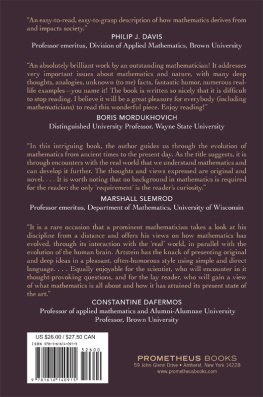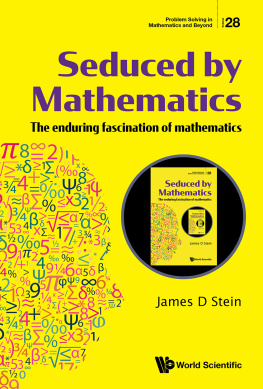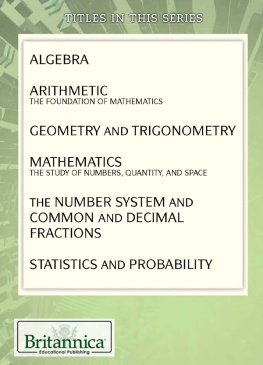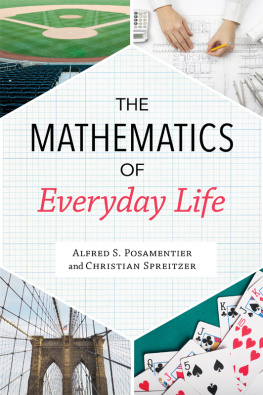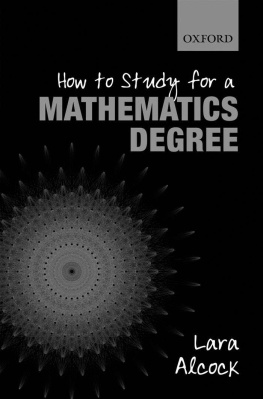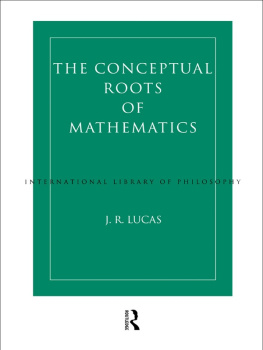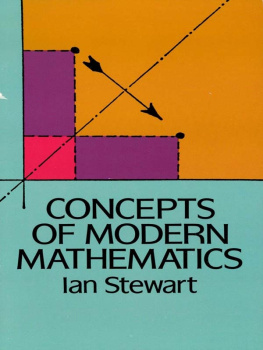
The reader will certainly have noticed the oft-repeated claim in the book that evolution did not prepare us for entirely error-free rigorous analysis and discussion. I would ask readers to treat any errors that they will almost certainly find in the book in that spirit.

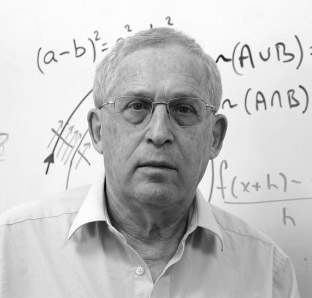
Photo by Raanan Michael
ZVI ARTSTEIN is the Hettie H. Heineman Professor of Mathematics at The Weizmann Institute of Science, where he has worked for over thirty-eight years as a scientist, a teacher, and an administrator. He is the author of more than 120 scientific articles published in peer-reviewed journals.

Could evolution have affected mathematics? Can horses perform calculations? Can rats count? Do infants solve problems of addition and subtraction? Which rectangles please us? Why are clowns scary? What color are the sheep in Ireland? What number comes next in the sequence 4, 14, 23, 34, 42, 50, 59,? Why square the circle? How have optical illusions contributed to science?
1. EVOLUTION
The theory of evolution is attributed to Charles Darwin, but it was not Darwin who initiated the study of evolution. King Solomon stated, There is nothing new under the sun, (Ecclesiastes 1:9), a philosophical statement alluding to the observation that the world is in a constant state of flux. At any given time we see the current situation around us, but we also follow changes that take place in our lifetime, and we are aware of changes occurring over periods of time that we are unable to observe directly. The evidence regarding changes that took place in the past often enables us to infer what caused those changes. That applies both to the physical world, such as rocks, flora, and fauna, and to society, including modes of behavior, fashion, literature, medical practices, and technology. The changes take place according to their own mechanism. Sometimes it is clear to us what survives, what is modified, and what becomes extinct, but it is not always easy to identify the mechanism.
Let us take as an example the Earth's surface. Some rocks exist for many years, while others are weathered and eroded by the wind almost as we watch. What causes the difference? Clearly it is the different rock textures that determine the differences in their ability to survive. Basalt will last, while limestone will crumble. There are no sand dunes on the tops of mountains because they would be blown away by the wind. We could say that the strong triumph, the fittest survive. We can deduce that being made of basalt is an advantage in the battle for survival on a mountain peak. That statement is trivial in the realm of rocks, and we do not usually examine rocks in terms of the competition for survival. But the conclusion that whatever is most suited to its environment survives is correct regarding rocks as well as human society. Historians, in discussing human history, try to understand why a particular society survived and another disappeared. Their conclusions generally refer to the advantages that the victors had over the vanquished. We can learn about the conditions under which a society or species developed from its specific characteristics. Likewise, from the conditions in which it developed, we can learn about the advantages that enabled it to win the battle for survival.
Darwin's great contribution to the theory of evolution was in identifying the mechanism by which different species of animals and plants changed and developed. Unlike Lamarck, who claimed that every species adapts to its environment and the characteristics it takes on are passed from each generation to the next, Darwin proposed a different mechanism responsible for the changes that every species undergoes. The mechanism consists of two main elements: mutation and selection. In the reproduction process, individuals undergo mutations that cause random and generally minor changes in their characteristics. The individuals with the best-suited characteristics reproduce at the fastest rate, and that constitutes the selection that results in successive generations of each species being better suited to the environmental conditions. The best-suited species among those competing for the same food resources are the ones that survive.
Charles Robert Darwin (18091882) was born in the town of Shrewsbury, England, to a well-established family. His father, Robert, was a wealthy physician. His grandfather, Erasmus Darwin, who died before Charles was born but whose writings were available to Charles, was a philosopher and a naturalist who favored the theory of evolution of the leading French naturalist Jean-Baptiste de Monet, Chevalier de Lamarck (17441829), known simply as Lamarck. Young Charles was exposed to scientific endeavors but was not a particularly industrious student. Instead of devoting his time to his studies, he preferred to observe nature and to collect various items, particularly beetles of different types. When he was twenty-three he was invited to join an expedition due to sail on a ship called the Beagle as its scientist; the main purpose of the expedition was to chart the shores of Australia and South America for the British Empire. His role was to collect and classify geological, zoological, and botanical specimens. In the course of the voyage Darwin noted that different but similar species could be found living in regions near each other, specifically on the Galapagos Islands. It was there that he conceived the model of evolution consisting of mutations and selection. It should be noted that Darwin, in developing his theory of the evolution of types of flora and fauna, was deeply influenced by the theory of the political philosopher Thomas Malthus (who lived half a century before him) on the demographic and economic development of human societies. Darwin's autobiography shows him to have been a modest and wise man; it is replete with statements indicating a deep understanding of evolution beyond the technique he developed. For example, in his reference to his elderly colleague Leonard Jenyns, with whom he had many discussions about nature, Darwin writes, At first I disliked him from his somewhat grim and sarcastic expression, and it not often that a first impression is lost, but I was completely mistaken. The connection between it is not often that a first impression is lost and evolution will be discussed further on in the book.
Although Darwin shared his thoughts on evolution and the ample evidence he had found supporting his theory with his scientific colleagues, among them some of the best-known English scientists in those days, he refused to publish his findings. He agreed to publish his theory only after Alfred Wallace, a young naturalist researcher who had undertaken many voyages to South America and the Far East, submitted a paper for publication containing ideas similar to those of Darwin but with only a flimsy basis. Darwin's friends became aware of this and urged him to publish his book, The Origin of Species. As a result, in the first official presentation of the theory, Wallace's article and Darwin's theory appeared at the same time.
Next page
